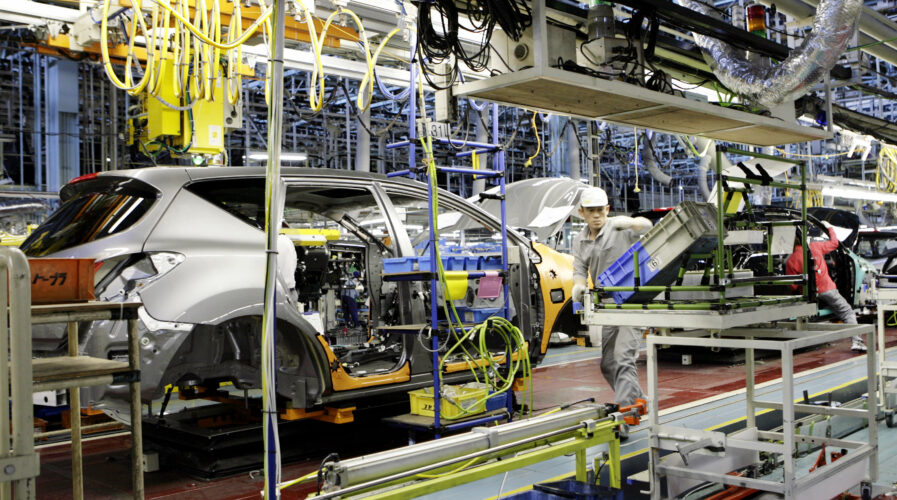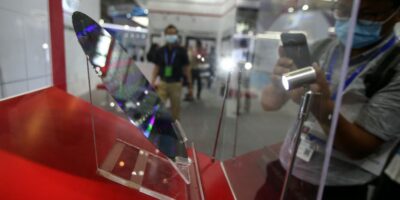
How are carmakers compromising due to chip shortage? AFP PHOTO / Yoshikazu TSUNO (Photo by AFP)
Making do – How carmakers are dealing with the global chip shortage
- To keep production going, automakers cut back on functions like navigation systems and large displays as the crisis worsens
- The ongoing semiconductor shortage will cost the global automotive industry US$110 billion in lost revenues in 2021, with the production of 3.9m vehicles written off
Automakers are feeling the pain of a global chip shortage, and as the crisis stretches into its fifth month, companies are forced to halt the production of certain vehicles while others are removing some options that rely heavily on chips. The situation is so dire that it will leave dealers with a reduced inventory.
A forecast by the automotive and industrial practiceAlixPartners said the ongoing semiconductor shortage will cost the global automotive industry US$110 billion in lost revenues this year, up more than 80% from the consultancy’s late-January estimate of US$61 billion. The group also estimated that the production of 3.9 million vehicles will be lost in 2021 as a result of the shortage.
AlixPartners global co-leader Mark Wakefield highlighted how “the pandemic-induced chip crisis has been exacerbated by events that normally just bump in the road for the auto industry, such as a fire in a key chip-making fabrication plant, severe weather in Texas, and drought in Taiwan. But all these things are now major issues for the industry – which, in turn, has driven home the need to build supply-chain resiliency for the long term.”
Wakefield adds that “there are up to 1,400 chips in a typical vehicle today, and that number is only going to increase as the industry continues its march toward electric vehicles, ever-more connected vehicles and, eventually, autonomous vehicles. So, this really is a critical issue for the industry.”
That said, the top priority for companies right now is mitigating the short-term effects of this disruption, the best they can. The effects can be far-reaching, including everything from renegotiating contracts to managing the expectations of lenders and investors. Wakefield said the important thing is to be proactive and to be well-armed with good information and analysis.
What is the chip shortage making automaker compromise?
According to a Bloomberg report, Japanese car manufacturer Nissan is leaving navigation systems out of thousands of vehicles that typically would have them because of the shortages. Its Ram no longer offers its 1500 pickups with a standard “intelligent” rearview mirror that monitors for blind spots. On the other hand, Renault has stopped offering an oversized digital screen behind the steering wheel on its Arkana SUV – also to save on semiconductors.
Analysts believe the crisis is a historic test for the century-old auto industry just as it is trying to accelerate a shift toward smarter, electric vehicles. For decades, carmakers moved steadily to include more advanced features; now, they’re stripping some of them out – at least temporarily – to salvage their sales.
To top it off, just last week, BMW AG, Honda Motor Co., and Ford Motor Co. all flagged worsening problems from chip shortages. A failure to secure critical supplies is a massive short-term setback, as millions of vehicle sales will be lost this year, and bodes ill for the future as competition from tech-savvy internet and consumer-electronics companies intensifies – several are already working on their own high-tech vehicle alternatives.
In hindsight, much like Apple and Tesla, Volkswagen too plans to design and develop its own high-powered chips for autonomous vehicles, along with the required software. The German automaker, however, wouldn’t build the chips themselves but did want to own patents. The company’s software division, Cariad, would expand to develop the expertise and expand.
READ MORE
- Ethical AI: The renewed importance of safeguarding data and customer privacy in Generative AI applications
- How Japan balances AI-driven opportunities with cybersecurity needs
- Deploying SASE: Benchmarking your approach
- Insurance everywhere all at once: the digital transformation of the APAC insurance industry
- Google parent Alphabet eyes HubSpot: A potential acquisition shaping the future of CRM


